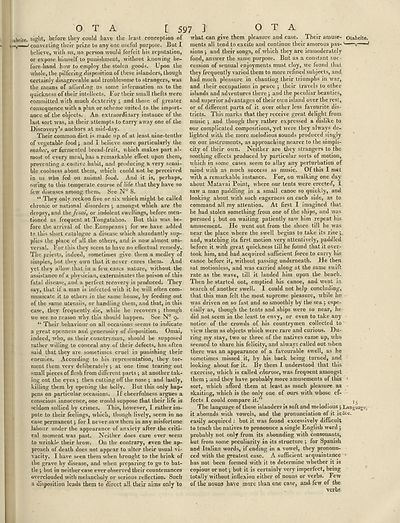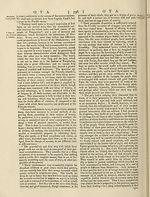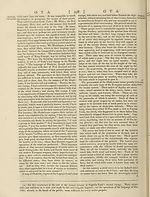Encyclopaedia Britannica > Volume 15, NIC-PAR
(673) Page 597
Download files
Complete book:
Individual page:
Thumbnail gallery: Grid view | List view

OTA [S97] OTA
sight, before they could have the least conception of
converting their prize to any one useful purpose. But I
believe, with us, no person would forfeit his reputation,
or expose himself to punishment, without knowing be.-
fore-hand how to employ the stolen goods. Upon the
whole, the pilfering disposition of these islanders, though
certainly disagreeable and troublesome to strangers, was
the means of atlording us some information as to the
quickness of their intellects. For their small thefts were
committed with much dexterity j and those of greater
Consequence with a plan or scheme suited to the import¬
ance of the objects. An extraordinary instance of the
last sort was, in their attempts to Carry away one of the
Discovery’s anchors at mid-day.
Their common diet is made up of at least nine-tenths
of vegetable food j and I ladieve more particularly the
tnahec, or fermented bread-fruit, which makes part al¬
most of every meal, has a remarkable effect upon them,
preventing a costive habit, and producing a very sensi¬
ble coolness about them, which could not be perceived
in us who fed on animal food. And it is, perhaps,
ow ing to this temperate course of life that they have so
few diseases among them. See N° 8.
“ They only reckon five or six which might be called
chronic or national disorders ; amongst which are the
dropsy, and the ^.vfl/’, or indolent swellings, before men¬
tioned as frequent at Tongataboo. But this was be¬
fore the arrival of the Europeans •, for we have added
to this short catalogue a disease which abundantly sup¬
plies the place of all the others, and is now almost uni¬
versal. For this they seem to have no effectual remedy.
The priests, indeed, sometimes give them a medley of
simples, but they own that it never cures them. And
yet they allow7 that in a few cases nature, without the
assistance of a physician, exterminates the poison of this
fatal disease, and a perfect recovery is produced. They
say, that if a man is infected with it he will often com¬
municate it to others in the same house, by feeding out
of the same utensils, or handling them, and that, in this
case, they frequently die, while he recovers j though
we see no reason why this should happen. See N° 9.
“ Their behaviour on all occasions seems to indicate
a great openness and generosity of disposition. Omai,
indeed, who, as their countryman, should be supposed
rather willing to conceal any of their defects, has often
said that they are sometimes cruel in punishing their
enemies. According to his representation, they tor¬
ment them very deliberately 5 at one time tearing out
small pieces of flesh from different parts •, at another tak¬
ing out the eyes ; then cutting oft’the nose j and lastly,
killing them by opening the belly* But this only hap¬
pens on particular occasions. If cheerfulness argues a
conscious innocence, one w'ould suppose that their life is
seldom sullied by crimes. This, however, I rather im¬
pute to their feelings, which, though lively, seem in no
case permanent *, for I never saw them in any misfortune
labour under the appearance of anxiety after the criti¬
cal moment was past. Neither does care ever seem
to wrinkle their brow7. On the contrary, even the ap¬
proach of death does not appear to alter their usual vi¬
vacity. I have seen them when brought to the brink of
the grave by disease, and when preparing to go to bat¬
tle j hut in neither case ever observed their countenances
overclouded with melancholy or serious reflection. Such
a disposition leads them to direct all their aims only to
what can give them pleasure and case. Their arouse- Otaheite.
ments all tend to excite and continue their amorous pas- —v——J
sions j and their songs, of which they are immoderately
fond, answ7er the same purpose. But as a constant suc¬
cession of sensual en joyments must cloy, we found that
they frequently varied them to more refined sub jects, and
had much pleasure in chanting their triumphs in war,
and their occupations in peace j their travels to other
islands and adventures there ; and the peculiar beauties,
and superior advantages of their ow n island over the rest,
or of different parts of it over other less favourite dis¬
tricts. This marks that they receive great delight from
music ; and though they rather expressed a dislike to
our complicated compositions, yet were they always de¬
lighted with the more melodious sounds produced singly
on our instruments, as approaching neai’er to the simpli¬
city of their own. Neither are they strangers to the
soothing effects produced by particular sorts of motion,
which in some cases seem to allay any perturbation of
mind with as much success as music. Of this I met
with a remarkable instance. For, on walking one day
about Matavai Point, where our tents were erected, 1
saw a man paddling in a small canoe so quickly, and
looking about with such eagerness on each side, as to
command all my attention. At first I imagined that
he had stolen something from one of the ships, and w-as
pursued j but on waiting patiently saw him repeat his
amusement. He went out from the shore till he was
near the place where the swell begins to take its rise;
and, watching its first motion very attentively, paddled
before it with great quickness till he found that it over¬
took him, and had acquired sufficient force to carry his
canoe before it, without passing underneath. He then
sat motionless, and was carried along at the same swift
rate as the wave, till it landed him upon the beach.
Then he started out, emptied his canoe, and went in
search of another swell. I could not help concluding,
that this man felt the most supreme pleasure, while he
was driven on so fast and so smoothly by the sea j espe¬
cially as, though the tents and ships were so near, he
did not seem in the least to envy, or even to take any
notice of the crowds of his countrymen collected to
view them as objects which were rare and curious. Du¬
ring my stay, two or three of the natives came up, who
seemed to share his felicity, and always called out when
there was an appearance of a favourable swell, as he
sometimes missed it, by his back being turned, and
looking about for it. By them I understood that this
exercise, which is called ehorooe, was frequent amongst
them j and they have probably more amusements of this -•
sort, which afford them at least as much pleasure as •
skaiting, which is the only one of ours with whose ef¬
fects I could compare it.”
The language of these islanders is soft and melodious ; Language;
it abounds with vowels, and the pronunciation of it is&c.
easily acquired : but it was found excessively difficult
to teach the natives to pronounce a single English word ;
probably not only from its abounding with consonants,
but from some peculiarity in its structure •, for Spanish
and Italian words, if ending in a vowel, they pronoun¬
ced w7ith the greatest ease. A sufficient acquaintance 1
has not been formed with it to determine whether it is
copious or not j but it is certainly very imperfect, being
totally without inflexion either of nouns or verbs. Few
of the nouns have more than one case, and few of the
verbs
sight, before they could have the least conception of
converting their prize to any one useful purpose. But I
believe, with us, no person would forfeit his reputation,
or expose himself to punishment, without knowing be.-
fore-hand how to employ the stolen goods. Upon the
whole, the pilfering disposition of these islanders, though
certainly disagreeable and troublesome to strangers, was
the means of atlording us some information as to the
quickness of their intellects. For their small thefts were
committed with much dexterity j and those of greater
Consequence with a plan or scheme suited to the import¬
ance of the objects. An extraordinary instance of the
last sort was, in their attempts to Carry away one of the
Discovery’s anchors at mid-day.
Their common diet is made up of at least nine-tenths
of vegetable food j and I ladieve more particularly the
tnahec, or fermented bread-fruit, which makes part al¬
most of every meal, has a remarkable effect upon them,
preventing a costive habit, and producing a very sensi¬
ble coolness about them, which could not be perceived
in us who fed on animal food. And it is, perhaps,
ow ing to this temperate course of life that they have so
few diseases among them. See N° 8.
“ They only reckon five or six which might be called
chronic or national disorders ; amongst which are the
dropsy, and the ^.vfl/’, or indolent swellings, before men¬
tioned as frequent at Tongataboo. But this was be¬
fore the arrival of the Europeans •, for we have added
to this short catalogue a disease which abundantly sup¬
plies the place of all the others, and is now almost uni¬
versal. For this they seem to have no effectual remedy.
The priests, indeed, sometimes give them a medley of
simples, but they own that it never cures them. And
yet they allow7 that in a few cases nature, without the
assistance of a physician, exterminates the poison of this
fatal disease, and a perfect recovery is produced. They
say, that if a man is infected with it he will often com¬
municate it to others in the same house, by feeding out
of the same utensils, or handling them, and that, in this
case, they frequently die, while he recovers j though
we see no reason why this should happen. See N° 9.
“ Their behaviour on all occasions seems to indicate
a great openness and generosity of disposition. Omai,
indeed, who, as their countryman, should be supposed
rather willing to conceal any of their defects, has often
said that they are sometimes cruel in punishing their
enemies. According to his representation, they tor¬
ment them very deliberately 5 at one time tearing out
small pieces of flesh from different parts •, at another tak¬
ing out the eyes ; then cutting oft’the nose j and lastly,
killing them by opening the belly* But this only hap¬
pens on particular occasions. If cheerfulness argues a
conscious innocence, one w'ould suppose that their life is
seldom sullied by crimes. This, however, I rather im¬
pute to their feelings, which, though lively, seem in no
case permanent *, for I never saw them in any misfortune
labour under the appearance of anxiety after the criti¬
cal moment was past. Neither does care ever seem
to wrinkle their brow7. On the contrary, even the ap¬
proach of death does not appear to alter their usual vi¬
vacity. I have seen them when brought to the brink of
the grave by disease, and when preparing to go to bat¬
tle j hut in neither case ever observed their countenances
overclouded with melancholy or serious reflection. Such
a disposition leads them to direct all their aims only to
what can give them pleasure and case. Their arouse- Otaheite.
ments all tend to excite and continue their amorous pas- —v——J
sions j and their songs, of which they are immoderately
fond, answ7er the same purpose. But as a constant suc¬
cession of sensual en joyments must cloy, we found that
they frequently varied them to more refined sub jects, and
had much pleasure in chanting their triumphs in war,
and their occupations in peace j their travels to other
islands and adventures there ; and the peculiar beauties,
and superior advantages of their ow n island over the rest,
or of different parts of it over other less favourite dis¬
tricts. This marks that they receive great delight from
music ; and though they rather expressed a dislike to
our complicated compositions, yet were they always de¬
lighted with the more melodious sounds produced singly
on our instruments, as approaching neai’er to the simpli¬
city of their own. Neither are they strangers to the
soothing effects produced by particular sorts of motion,
which in some cases seem to allay any perturbation of
mind with as much success as music. Of this I met
with a remarkable instance. For, on walking one day
about Matavai Point, where our tents were erected, 1
saw a man paddling in a small canoe so quickly, and
looking about with such eagerness on each side, as to
command all my attention. At first I imagined that
he had stolen something from one of the ships, and w-as
pursued j but on waiting patiently saw him repeat his
amusement. He went out from the shore till he was
near the place where the swell begins to take its rise;
and, watching its first motion very attentively, paddled
before it with great quickness till he found that it over¬
took him, and had acquired sufficient force to carry his
canoe before it, without passing underneath. He then
sat motionless, and was carried along at the same swift
rate as the wave, till it landed him upon the beach.
Then he started out, emptied his canoe, and went in
search of another swell. I could not help concluding,
that this man felt the most supreme pleasure, while he
was driven on so fast and so smoothly by the sea j espe¬
cially as, though the tents and ships were so near, he
did not seem in the least to envy, or even to take any
notice of the crowds of his countrymen collected to
view them as objects which were rare and curious. Du¬
ring my stay, two or three of the natives came up, who
seemed to share his felicity, and always called out when
there was an appearance of a favourable swell, as he
sometimes missed it, by his back being turned, and
looking about for it. By them I understood that this
exercise, which is called ehorooe, was frequent amongst
them j and they have probably more amusements of this -•
sort, which afford them at least as much pleasure as •
skaiting, which is the only one of ours with whose ef¬
fects I could compare it.”
The language of these islanders is soft and melodious ; Language;
it abounds with vowels, and the pronunciation of it is&c.
easily acquired : but it was found excessively difficult
to teach the natives to pronounce a single English word ;
probably not only from its abounding with consonants,
but from some peculiarity in its structure •, for Spanish
and Italian words, if ending in a vowel, they pronoun¬
ced w7ith the greatest ease. A sufficient acquaintance 1
has not been formed with it to determine whether it is
copious or not j but it is certainly very imperfect, being
totally without inflexion either of nouns or verbs. Few
of the nouns have more than one case, and few of the
verbs
Set display mode to:
![]() Universal Viewer |
Universal Viewer | ![]() Mirador |
Large image | Transcription
Mirador |
Large image | Transcription
Images and transcriptions on this page, including medium image downloads, may be used under the Creative Commons Attribution 4.0 International Licence unless otherwise stated. ![]()
| Encyclopaedia Britannica > Encyclopaedia Britannica > Volume 15, NIC-PAR > (673) Page 597 |
|---|
| Permanent URL | https://digital.nls.uk/192590447 |
|---|
| Attribution and copyright: |
|
|---|
| Shelfmark | EB.11 |
|---|---|
| Description | Ten editions of 'Encyclopaedia Britannica', issued from 1768-1903, in 231 volumes. Originally issued in 100 weekly parts (3 volumes) between 1768 and 1771 by publishers: Colin Macfarquhar and Andrew Bell (Edinburgh); editor: William Smellie: engraver: Andrew Bell. Expanded editions in the 19th century featured more volumes and contributions from leading experts in their fields. Managed and published in Edinburgh up to the 9th edition (25 volumes, from 1875-1889); the 10th edition (1902-1903) re-issued the 9th edition, with 11 supplementary volumes. |
|---|---|
| Additional NLS resources: |
|

